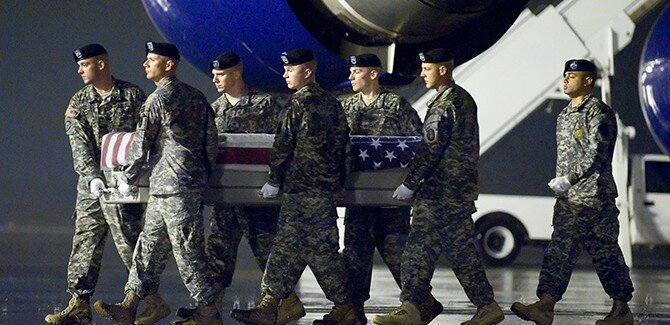Honoring Our Fallen with Dignity

Commentary By David Small
Staff Sgt. Donna R. Johnson, 29, of Raeford, N.C., a lesbian soldier from the North Carolina Army National Guard, was posthumously promoted. She is survived by her wife, Tracy Dice. She died Oct. 1 in Khost, Afghanistan, after a suicide bomber attacked her patrol. Sgts. Thomas J. Butler, IV, and Jeremy F. Hardison also died in the attacks. These three Americans were assigned to the 514th Military Police Company, 60th Troop Command, Winterville, N.C. The Department of Defense announced this information Oct. 3 via a press release, as they do with all casualties.
Reviewing the case, many of the notification procedures involving an LGBT spouse should have gone differently, but this may have been gross bureaucratic oversight rather than blatant discrimination as the media has portrayed it. Regardless, things need to change and LGBT service members need to be very diligent in maintaining their records.
The much criticized Defense of Marriage Act has guaranteed Tracy won’t have access to survivor benefits, nor any of the other things the military does for family members of our fallen—necessary support both financially and otherwise. That’s the legal side. I don’t think it’s fair. It’s not equal. It makes my heart hurt. But I get it. It’s law. It’ll eventually be made right, I hope and pray. Just not in time to help Tracy now, today.
 Fortunately those around Tracy, within Sgt. Johnson’s command and their community, are treating Tracy as any other military spouse should be treated on a personal level, without regard to officially recognizing their marriage, according to the American Military Partners Association (AMPA). And Tracy is well connected to AMPA should she need any referrals for support and assistance.
Fortunately those around Tracy, within Sgt. Johnson’s command and their community, are treating Tracy as any other military spouse should be treated on a personal level, without regard to officially recognizing their marriage, according to the American Military Partners Association (AMPA). And Tracy is well connected to AMPA should she need any referrals for support and assistance.
As a matter of fact, once the Army realized the situation, Tracy was allowed to escort her wife’s remains home and gave her time to manage their affairs. Bravo to her command who did more than legally required by treating Tracy respectfully.
But there’s another side of this process that could have caused the situation to be much worse. There are many lines on checklists, procedures and forms that could have made Sgt. Johnson’s tragic death even more unnecessarily horrible. I refuse to believe there is an ugly little man behind the curtain at DoD pushing buttons and grinding levers to actively block gay and lesbian couples from being treated the same during things as sacrosanct as notifying the next of kin or releasing whom a Soldier is survived by.
Instead, I believe DoD has not yet caught up with much of the administrative implications of repealing “Don’t Ask, Don’t Tell.” It is time to fix this and we, as OutServe-SLDN Members, need to help.
“Even though there is no place for the Army to officially recognize a relationship status in an official sense, there is nothing that stops the Soldier from providing a copy of the marriage license to the company personnel NCO or to their commander,” said Tracey Hepner a co-founder of the Military Partners and Families Coalition.
Doing so does not change the legal standing on a national level, but provides credibility to any future claim of recognizing the relationship.
“We must highlight that recognition for benefits and recognition for dignity are not the same thing,” Hepner said. “Denying benefits doesn’t obligate anyone to deny dignity concerning how the Soldier defined the relationship, as evidenced by a marriage certificate issued legally by a state.”
Robert Johnson in Business Insider’s story “When This Woman Was Killed In Combat It Exposed How The Government Really Treats Same-Sex Spouses,” wrote, “And perhaps most striking of all is that when the suicide bomber ripped through that Afghan market October 1 killing her wife, Tracy had to hear about it second-hand, because the Army refused to acknowledge her as the primary next of kin.”
I can’t confirm that’s true, but if it is, it is a gross and unforgivable oversight. I do wish I knew whether Sgt. Johnson had the forethought to update her DD Form 93 to ensure Tracy Dice was on the Army’s radar.
“The DD Form 93 must speak for service members beyond the grave and defend their families when they are no longer able to do so,” Hepner said.
Having been on the receiving end of a Marine colonel and chaplain coming to Camp Lejeune High School to tell me my father had been shot down over Iraq nearly 22 years ago (and the countless press releases of Airmen killed in action that I processed and released from the Air Force’s media operations desk) has instilled in me the importance of the casualty notification process. There is no room for error, especially now, with the shift in policy allowing media to cover dignified transfer ceremonies with family approval.
Defense spokeswoman Cynthia Smith explained the process of what happens after the primary next of kin is notified. There is a 24-hour period after next-of-kin notification before DoD releases a name. However, that period is waived if the primary next of kin approves media coverage of the member’s dignified transfer.
If there’s not going to be media coverage, then the 24-hour clock starts after everybody listed on the DD Form 93 has been notified.
The Business Insider story also details another slight to Tracy. She wasn’t listed in the initial reports as surviving her wife, as were the other two Guardsmen’s wives. Why? Nowhere in any DoD personnel system is a line of text identifying a legally married same-sex spouse.
“You can only give out what is in an official record under the Privacy Act. Under her record, as far as the military is concerned, there was no record of her as having a spouse,” Lt. Col. Robert Carver, the public affairs officer for the North Carolina National Guard, said when asked why Sgt. Johnson’s wife wasn’t listed in media reports.
How would the local unit even know Tracy exists if she’s not in the record as Sgt. Johnson’s wife?
We can’t let something like this happen because of a line on a form. No law should be able to tell anybody who their kin is. All our service members should be able to tell DoD who they want notified, in what order, and what names to release as survivors. It is the very least—very least—we can do to honor their last wishes.
This seemingly simple and logical course of action has nothing to do with a person’s sexuality. There are plenty of heterosexual folks who would probably object to who their legal next of kin are as well.







